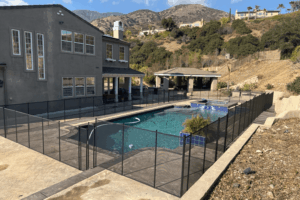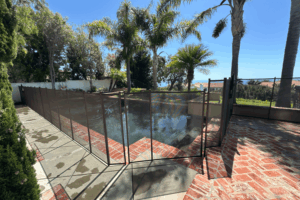
10 Questions to Ask Before Buying a Pool Safety Fence
Don’t buy a pool safety fence without asking these essential questions. This buyer’s guide helps you evaluate height, compliance, materials, installation, and more.
Home > Pool Accidents Are On The Rise, Install A Pool Fence In Arizona

Swimming and other water-related activities are one of the most favorite pastime activities for many Americans, especially during the hot summer months. However, drowning represents one of the most common dangers of swimming, accounting for nearly 3,000 deaths annually. For children under the age of four, drowning takes the top spot as the leading cause of accidental death.
In the state of Arizona, the numbers of drowning-related deaths constantly surpass the national average with about 90 people, including children, dying annually. Safety barriers in Arizona such as pool fences are a significant factor in the safety of pools.
In some cities in Arizona, the number of drowning-related child fatalities is on the rise. For instance, in Phoenix, the number of children who drowned in 2014 had almost doubled halfway through the year compared with those who died in 2013. In 2015, Phoenix has had eight drowning-related incidents involving six children under the age of five and two adults. The city has already recorded one pediatric fatality.
In Scottsdale, there have been four incidents involving residential drowning incidents involving one pediatric child and three adults, where one adult died. Tempe and Gilbert fire departments reported single incidents related to drowning, where one pediatric child was injured in both cities.
In the cities of Mesa and Chandler, the fire departments reported two drowning-related incidents in both cities where a total of three pediatric children and one adult were injured. There have been 34 water-related incidents in the period up to May of 2015, which resulted in nine deaths including two pediatric children and six adults.
The relatively high number of child deaths associated with water-related incidents has raised concerns among legislators, community leaders, and other stakeholders. Enclosed pool areas are significantly safer, and legislators are looking at ways to encourage more pool fences in Arizona.
In efforts to protect the welfare and safety of children in Arizona, the Arizona State Legislature passed A.R.S. § 36-1681, which regulates access to residential swimming pools by children. As part of the regulations, the law requires all residences with pools and children under six years to have an enclosure around the swimming pool.
The enclosure can be a removable mesh pool fence, wall, or barrier that stands at over 5 feet, and is 20 inches from the edge of the pool water. Additionally, the enclosure should only have doors or gates and no other openings or structures that would enable someone to climb the barrier. Contact a local pool fence company such as All-Safe Pool and talk with the professional pool fence installer in Arizona.
It is also important to note that any gates providing direct access to the pool should open outwards and should be self-latching and self-locking to prevent children from gaining easy and unsupervised access to the swimming pool area.
Install a pool fence around the perimeter of your pool area and include a gate that should always be locked and secured. The locks and latches should be regularly checked for any defects to ensure they are in proper working order. Get in touch with a professional pool fence installation company, such as All-Safe Pool Fence & Covers, who will install a pool fence in Arizona and specializes in backyard pools in the Greater Phoenix area.
Many parents or guardians who have lost children in drowning incidents will often recount that their children drowned quickly and without a sound. One of the reasons children drown without sound (especially children under the age of 5) is they may not comprehend danger and do not know they can scream and shout to alert others they are in distress.
Safeguard your children against near-drowning and drowning accidents by providing constant supervision. You should never leave a child unattended at the pool or near any watering body that is deep enough for the child to be submerged.
Ensure there are proper flotation devices like life jackets, access to a phone, and a first aid kit for emergencies within the pool area.
Enroll your child in a swimming class that also provides emergency training in courses such as CPR and first aid. However, swimming lessons and floatation devices should never be substituted for supervision because, even with the availability of the most sophisticated equipment, children might drown without supervision.
With the peak season for water activities approaching, it pays to stay vigilant over your child when they take to the pool. Attending a water rescue and CPR class will also go a long way in saving a child’s life and helping to curb the runaway mortalities associated with drowning.
Find your local dealer for a free on-site consultation on installing a pool fence in Arizona. A local expert can help you determine the right kind of safety barrier for your family to create a reliable and cost-effective solution.

Don’t buy a pool safety fence without asking these essential questions. This buyer’s guide helps you evaluate height, compliance, materials, installation, and more.

Understand how local pool fence codes work and what to check before installation. This beginner’s guide simplifies requirements so your safety barrier complies and protects effectively.

Learn the truth behind common pool safety myths and make better decisions to protect your family with fact‑based guidance on fences, barriers, and maintenance.
Enter your zip code to locate an independent installer in your area
Enter your zip code to locate an independent installer in your area

Due to the many variations in monitors, phones, and browsers, color samples and product examples may appear different on different screens. Computers and mobile devices are not all calibrated equally and color reproduction on the Internet is not precise. The same is true for printed items such as brochures and other sales literature.
In addition, the colors of our products photograph differently under different lighting conditions. For example, photos taken in full sunlight will vary from photos taken on a cloudy or overcast day. Similarly, shadows from nearby objects can affect the color and transparency of our products. If a precise color or specific shade is important, please inspect the actual color of your product prior to installation.
Many of our products’ materials are not available through typical stores and vendors and therefore must be custom manufactured specifically for our use. In order to control costs and provide you with the best value possible, our raw materials are produced in large batches and can often take several months to receive. The colors of our materials can, and often do, vary slightly from batch to batch. Although we make every effort to minimize color variations, we cannot be responsible for these differences when they occur. If a precise color or specific shade is important, please inspect the actual color of your product prior to installation.
For example, we use the name “putty” to describe some of our products. Your idea of the color “putty” may be different than someone else’s idea of “putty”. In addition, products may have the same color name but may not be the exact same color. For example, we have different shades of “black”. Please do not order using color names as your only guide. If a precise color or specific shade is important, please inspect the actual color of your product prior to installation.
If it is important that your product be an exact color or shade, it is highly recommended that you inspect the actual product prior to its installation and address any concerns with your local independent installer. Most independent installers do not offer refunds or accept returns due to color variations.